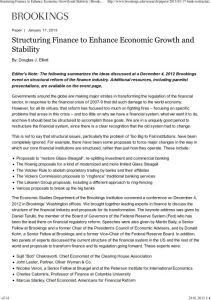Join getAbstract to access the summary!

Join getAbstract to access the summary!
Douglas J. Elliott
Structuring Finance to Enhance Economic Growth and Stability
Brookings Institution Press, 2013
What's inside?
The most commonly suggested financial industry reforms could have significant economic costs.
Recommendation
Governments responded symptomatically to the 2008 financial crisis and spent little time examining the structure and rationale of the financial system and its relationship to regulatory reform. The Economic Studies program at the Brookings Institution brought together experts and analysts from the US Federal Reserve System, universities and the financial industry to discuss fundamental issues related to the structure of finance. Among those participating were Daniel Tarullo, a member of the Board of Governors of the Federal Reserve System and the leader of the Fed’s financial reform efforts; Martin Baily, former chairman of the President’s Council of Economic Advisers; and Donald Kohn, former vice chairman of the Federal Reserve Board. Baily and Kohn are senior fellows at Brookings. They and other speakers expressed a variety of opinions but all agreed on the need for more extensive research about a range of fiscal issues. getAbstract recommends this informed discussion to anyone who wants an overview of the debate about the US financial industry and its reform.
Summary
About the Author
Douglas J. Elliott is a fellow in economic studies at the Brookings Institution, a nonprofit public policy organization based in Washington, DC.




















Comment on this summary